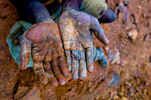
In a December 7 statement, Nevada-based Niotan Inc. claimed that it "does not source tantalum from the Democratic Republic of the Congo" and denied reports suggesting that it is linked to conflict minerals originating in eastern Congo.
The Report of the U.N. Group of Experts on the Democratic Republic of Congo, and concurrent research by the Enough Project, raises significant concerns regarding links between Niotan and a network of companies tied to conflict minerals originating in militarized mining sites in eastern Congo. Although Niotan claims to be "a leader regarding transparency and traceability," their statement provides no information on where Niotan does source its minerals from, and what steps they take to ensure that their materials are conflict-free.
Documents obtained by the U.N. Group of Experts and the Enough Project indicate the following:
1. Niotan imports tantalum from Refractory Metals Mining Company Ltd.
U.S. Customs records indicate that Niotan imported 31.8 tons of tantalum ore from Refractory Metals Mining Company Ltd. in 2009. This consisted of two different shipments on June 27, 2009 and October 31, 2009 from Hong Kong into Los Angeles and New York in container numbers MSKU7422214 and CCLU3471921. Furthermore, until January 2009, Refractory Metals was named Niotan, Ltd.
2. Refractory Metals sources Congolese tantalum from African Ventures Ltd.
Niotan Chief Executive Officer John Crawley is also a director of Refractory Metals. He admitted to U.N. investigators in writing that Refractory Metals received 53 metric tons of tantalum of Congolese origin from the company African Ventures Ltd, which is located on the same street as Refractory Metals in Hong Kong, China. Mr. Crawley stated that African Ventures trading activities are entirely financed by Refractory Metals.
Mr. Crawley told U.N. investigators that African Ventures was initially set up by his father and that "the company was set up to in order to purchase and hold concessions in the DRC that would form the basis of our long term mine investment strategy." Both Refractory Metals and African Ventures employ the consultant Chris Huber, according to Mr. Crawley. Mr. Huber has been linked to the trade in conflict minerals going back to the early part of this decade, when he worked for Rwanda Metals, a company set up by the Rwandan government to systematically export tantalum ore from occupied areas of eastern Congo.
3. African Ventures sources conflict minerals from eastern Congo.
African Ventures purchases minerals from an array of businesses linked to conflict actors in eastern Congo. This includes tantalum ore sourced from the MH1 concession in North Kivu, a militarized site linked to former members of the CNDP rebel group. African Ventures also sources other minerals, including tin ore and tungsten ore, from sources linked to the FDLR rebel group and the Bisie mining site in North Kivu, site of a massacre that killed 30 people on August 13.
Mr. Crawley said that Niotan never purchased any material from Congo, nor did it purchase any intermediate products resulting from Congolese minerals. Instead he suggests "a Chinese factory most likely" took this Congolese material.
To demonstrate transparency, both Niotan and Refractory Metals should make public the precise origins of their tantalum. This should include the tantalum imported by Niotan, as well as the tantalum supplied by African Ventures to Refractory Metals. For all of the materials purchased by Niotan and Refractory Metals containing tantalum, the two companies should provide due diligence documentation, including the precise origins of these materials and their chain of custody, and subject this documentation to independent verification.
Furthermore, in order to assure the U.S. government, United Nations officials, business associates, and the wider public that Niotan is not dealing with conflict minerals from eastern Congo, Niotan should disclose the owners and shareholders of Niotan, Refractory Metals, and African Ventures, and clarify the relationships between these entities.
Enough calls on the electronics industry to trace, audit, and certify the 3T (tantalum, tin, and tungsten) and gold minerals that it purchases as verifiably conflict-free. Enough further urges Congress to pass the Conflict Minerals Trade Act (H.R. 4128) and Congo Conflict Minerals Act (S. 891) to help clean up the conflict minerals supply chain.
Photo: Congo minerals. (Enough)

